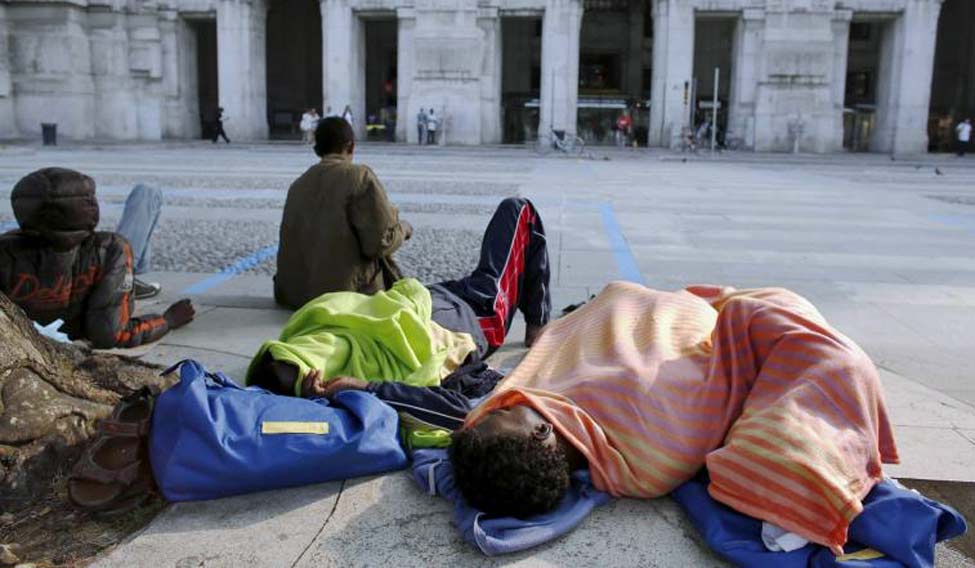French President Emmanuel Macaron spoke at the border town of Calais, France on January 16 to address migration and asylum processing. “In no event will we allow a ‘jungle’ to be rebuilt in Calais,” he insisted, referring to the refugee and migrant encampment which held up to an estimated 8,000 people in squatter-like conditions in 2015-16. The camp was bulldozed to the ground by officials in late 2016, though some 500 people still remain, attempting to cross into the UK. Macron said the situation in Calais can be blamed on “the brutality of our world” and will present a draft law on immigration reform next month.
France is among many European countries addressing immigration in these early weeks of 2018, though Macaron’s more progressive and humanitarian-leaning platform, which narrowly beat Marie Le Pen’s staunch anti-immigrant platform, is not becoming the norm among European nations.
The plight of nearly 2 million refugees and migrants who have fled to the Europe since 2015 has had a profound impact on the continent’s economic and political landscape. While the humanitarian aspect has been publicly debated and dissected over the last three years, the socioeconomic impact of the crisis is just beginning to register.
Socioeconomics studies the reciprocal relationship between economics and human dignity with the goal of social reconstruction and improvement. A major human displacement event typically results in a socioeconomic impact which forces societies to either progress, stagnate or regress. The EU has been caught in this storm. In the UK, fear around immigration was used effectively in pushing Brexit forward, and the result was the value of the pound plunged.
Germany, Europe’s financial power and leader, held elections in 2017 after Angela Merkel’s decision to take in more than 1 million refugees. Following reports that Germany spent more than 20 billion euros, or 0.35% of its GDP on asylum seekers, Merkel’s CDU party took a hit in the elections. While it still emerged as the largest party and has recently managed to form a coalition government, the radical anti-immigrant right wing AfD surged into Parliament for the first time with 13% of the votes. Once again, the message was clear: Germany’s slow motion move to the right is accelerating.
In October 2017, Austria outdid Germany when the far-right Freedom Party founded by ex-Nazis declared victory with 31% of the vote. The strong vote against the liberal politics pedaled by Macron and Merkel underscored the danger of ‘nationalism’ accredited to the refugee movement.
Greece and Italy have continued to struggle and cope with waves of refugees hitting their southern shores. Since the March 2016 EU-Turkey referendum, almost 70,000 migrants and refugees have been stranded in Greece alone, waiting for their asylum applications to be processed while living in squalid conditions without heat or electricity. Both countries have asked repeatedly for changes to the asylum process as they bear the burden with their borders closed. Poland, the Czech Republic and Hungary, meanwhile, have refused the EU directive to comply with their mandatory relocation quota. The European Commission is launching a legal case against these countries, a first in the short history of the EU, which threatens to split the union apart.
Recent polls in Scandinavian countries have indicated mixed feelings about migration. Once the progressive darlings of Europe who took pride in welcoming refugees, Sweden, Denmark and Norway have closed their doors to this population. Of particular note is Sweden, which had taken in more refugees per capita than any other European nation. When the financial cost of accepting asylum seekers reached 1% of its GDP, the Swedes reluctantly traded their welcoming policy for stricter border controls. This has included offering temporary permits in lieu of permanent residency, and increased restrictions on family reunifications.
Portugal, meanwhile, has taken a stand of solidarity with refugees and has requested more than 10,000 to be resettled. “It is in Portugal’s interest to be proactive, because there are areas of the country losing population and we have a serious demographic problem,” said Prime Minister António Costa. The largely Catholic country has taken a lead from Pope Francis’ pro-refugee stance and has created councils of religious institutions, nongovernmental organizations and universities across the country to boost integration and economic activity.
As the data from 2016 and 2017 continues to be analyzed, the social and cultural repercussions on this already fragile refugee population continues to reverberate throughout European countries. The right wing narrative of the loss of European identity by the mass influx of non-European asylum seekers will hopefully not continue to spread and replace the culture of welcoming those most in need. Europe’s long history of constant population movement and mixing of cultures has been conveniently ignored for the political gain of using migration as tool of fear. Debunking this narrative is hard work, but there is hope that the public will see the positive social and economic benefits migration has on their societies. Europe has been down this road before. As French historian Benjamin Stora says, the real challenge is the ‘challenge of knowing each other’, and that is a two-way street. Let us hope that nationalistic passion gives way to humanitarian compassion. An entire continent is at stake.
Kelsey LeBrun Keswani is the co-founder and executive director of Refugee Assistance and Information Network International, and provides consultation on humanitarian issues globally.
Disclaimer: The views expressed in this article are solely those of the author and do not necessarily represent the views of the publication





